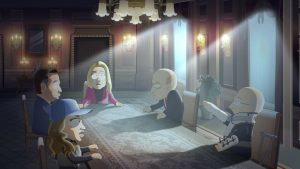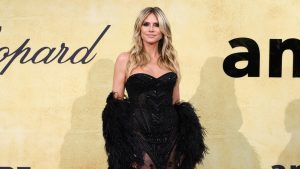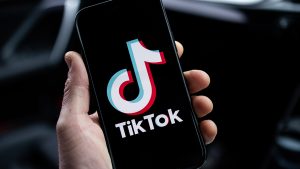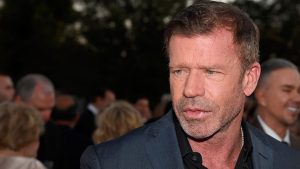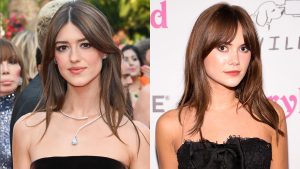
In a blink-and-you’ll-miss-it moment in the trailer for M3GAN 2.0, a bearded, long-haired fan of the movie’s title character declares, “I don’t care if she did kill four people, she’s a smokin’ hot warrior princess!”
That fan is fictional, but some of M3GAN‘s real-world fans may feel seen by the exuberant portrayal. After the Universal movie about a murderous, artificially intelligent doll opened in January 2023, it became a sleeper hit, grossing $180 million worldwide against a $12 million budget, thanks in part to some very ardent, very online gay moviegoers.
The marketing campaign for M3GAN 2.0, which opens June 27, is seeking to woo the original’s gay audience back to theaters, ideally with even more of their friends, and some heterosexual women, too. In a bit of strategic counterprogramming, M3GAN 2.0‘s release date places the PG-13 horror sequel opposite Apple/Warner Bros.’ Brad Pitt racing film F1, smack in the middle of a box office season typically devoted to straight male-skewing action movies and family fare.
“We love being in summer and trying to be a big event alongside the options primarily for guys,” says Michael Moses, chief marketing officer of Universal Pictures. “We believe there’s demand for something catering to young females and gay audiences.”
(Alas, this release timing is not, as comedian Matt Rogers speculated on the Las Culturistas podcast that he co-hosts with Bowen Yang, because “the gays are going to be so exhausted from Pride they’re gonna need to sit down and watch a movie.”)
The campaign for M3GAN 2.0 is playing to the original’s fan base with trailers featuring pop girl anthems like Britney Spears’ “Oops … I Did It Again” and Chappell Roan’s “Femininomenon”; an OUT magazine cover; a segment on RuPaul’s Drag Race; and even a troupe of M3GAN dolls dancing in West Hollywood’s Pride Parade.
All of this LGBTQ+-focused marketing comes despite the fact that M3GAN and its sequel, which come from merged horror producers Blumhouse and Atomic Monster, aren’t overtly gay movies. Neither Akela Cooper, the screenwriter of the first film, nor Gerard Johnstone, the director of both films and the screenwriter of the second, is gay, and there’s nothing explicitly queer about the premise, in which an AI doll becomes the overzealous caretaker of an 8-year-old girl. Allison Williams plays the roboticist who designs the doll and pairs it with her orphaned niece, but the real star is the doll herself, a quippy, loose-limbed murderess in a school uniform who is physically portrayed by New Zealand actress and dancer Amie Donald and voiced by Texan Jenna Davis. In the sequel, a defense contractor has stolen M3GAN’s technology to create a military robot called AMELIA (Ivanna Sakhno), setting up a Terminator 2-esque robot showdown.

Valerie Babchuk
***
M3GAN’s path to cultural phenomenon status began in October 2022 when Universal launched the first film’s trailer with a scene in which the doll performs a hypnotically creepy dance on National Coming Out Day. Once gay TikTok saw M3GAN’s moves, the rest was meme history. TikTok users layered clips of M3GAN dancing over Beyoncé, Lady Gaga and Megan Thee Stallion songs, clips from RuPaul’s Drag Race and lines of dialogue from Real Housewives. X users kept M3GAN in the conversation, too, with @CAdreamboy posting, “The director yelled ‘cut’ but Megan heard ‘cunt’ and she went with it,” over the six-second clip of the doll body rolling, while @mrunitedface shared a picture of Nicole Kidman looking haunted in the 2004 drama Birth and commented, “me trying to watch m3gan in theaters surrounded by twinks filming themselves shouting ‘mother’ at the screen.”
“I’m gay, so I wouldn’t say it was shocking,” says Moses of queer audiences’ role in M3GAN’s near-instant virality. “Look, she’s a killer doll with dance moves, a posh look and attitude.” By late January 2023, the movie was a box office hit, and the doll’s icondom was sealed in a spoof SNL trailer for a M3GAN sequel that promised to be “even more gay.”
Though it was obvious to Moses, it’s worth unpacking just why M3GAN spoke to gay audiences. The doll fits in a long line of messy heroines claimed by gay men, according to Joe Vallese, editor of the book It Came From the Closet: Queer Reflections on Horror. “Queer and gay men, we often look up to female artists and musicians because so much of that male gaze-y stuff really doesn’t apply to us,” Vallese says. “There’s just this constant admiration and elevation of complicated women, your Judy Garlands and your Bette Davises, your Madonnas and your Mariah Careys. Queer representation in media is still in the margins. In the meantime, the substitute that you look for as a gay man or as a queer person tends to be a woman.”

Mary Evans/Sony/Courtesy Everett Collection
M3GAN, Vallese says, “dresses up this technologically evil entity in little girl drag,” replicating a phenomenon in classic movies like Mervyn LeRoy’s 1956 psychological thriller The Bad Seed and William Friedkin’s 1973 supernatural horror film The Exorcist.
Identifying with a monster like M3GAN is a key theme in gay horror fandom, according to Heather O. Petrocelli, author of Queer for Fear: Horror Film and the Queer Spectator. “Straight society coded us the monster,” says Petrocelli, whose arm is covered with tattoos of such Universal monsters as Frankenstein and the Mummy. “And instead of internalizing that in a negative way, we just kind of were like, ‘Yeah, we’re going to make that empowering.’ It’s a cathartic fantasy.”
The movie’s camp tone also places it in the right register for many gay horror fans, Petrocelli notes. “It’s over-the-top, it’s stylized, it’s artificial in all of the ways that strike the right balance for the queer audience,” says Petrocelli. “M3GAN, she’s got this fierce bad attitude, deadpan delivery and subversive behavior. All of that is a version of queer coding.”

New World Releasing/Courtesy Everett Collection
From the beginning, the horror genre has employed gay filmmakers, such as Scream creator Kevin Williamson, Hellraiser writer-director Clive Barker and Frankenstein helmer James Whale. Petrocelli says she hopes to see studios investing more in queer horror talent, and not just queer horror fans. “We don’t just want to be spoken to,” she says. “We also want a seat at the table.”
But while gay audiences have helped propel the success of horror movies for generations, Universal’s open appeal to them on behalf of M3GAN 2.0 is unusual — and welcome, she says: “What’s new is that major studios are finally acknowledging our position, not as a niche demographic, but as a core audience driving the horror genre.”
This story appeared in the June 11 issue of The Hollywood Reporter magazine. Click here to subscribe.
#Gay #Fandom #M3GANs #Cult #Status

